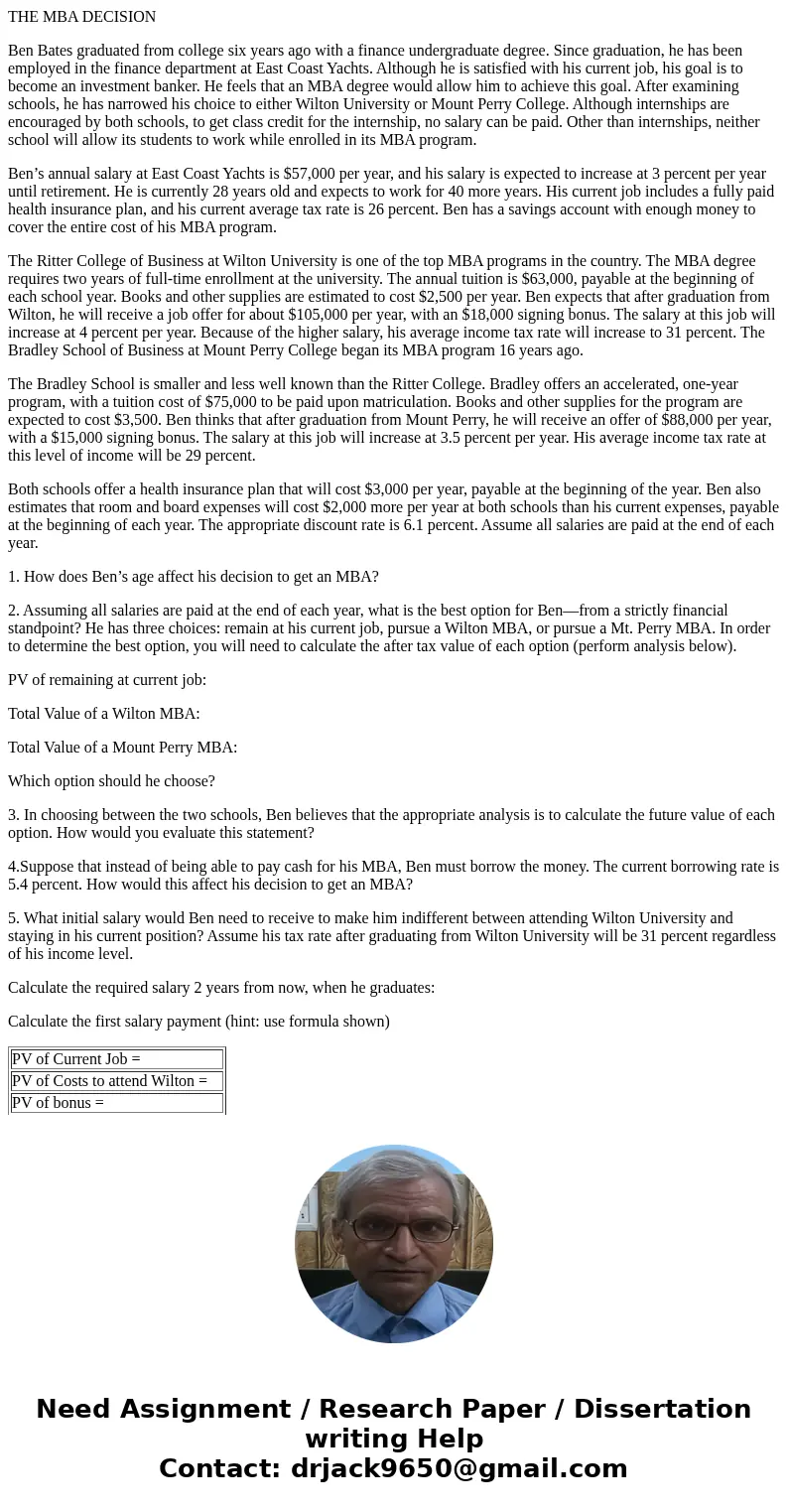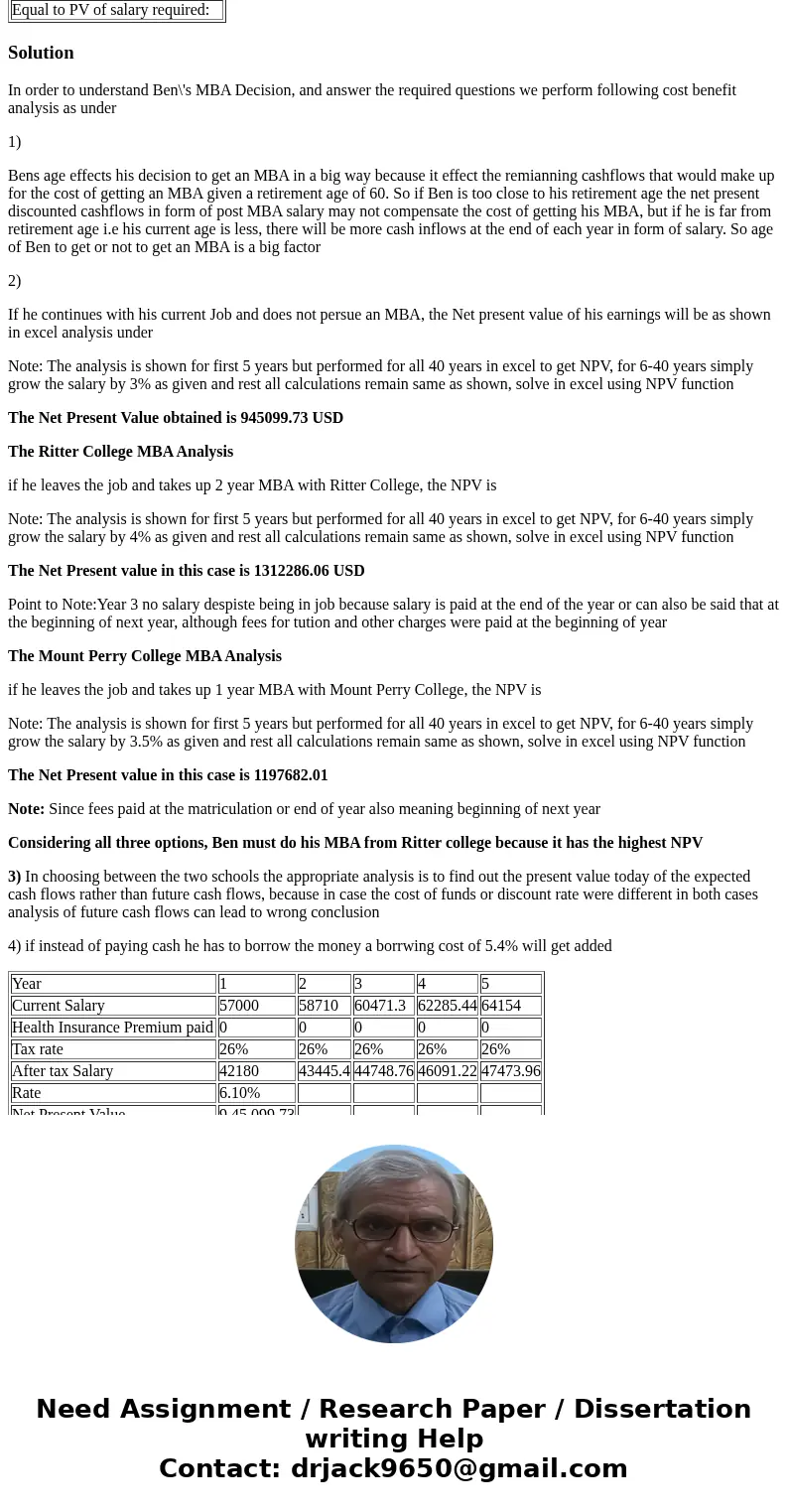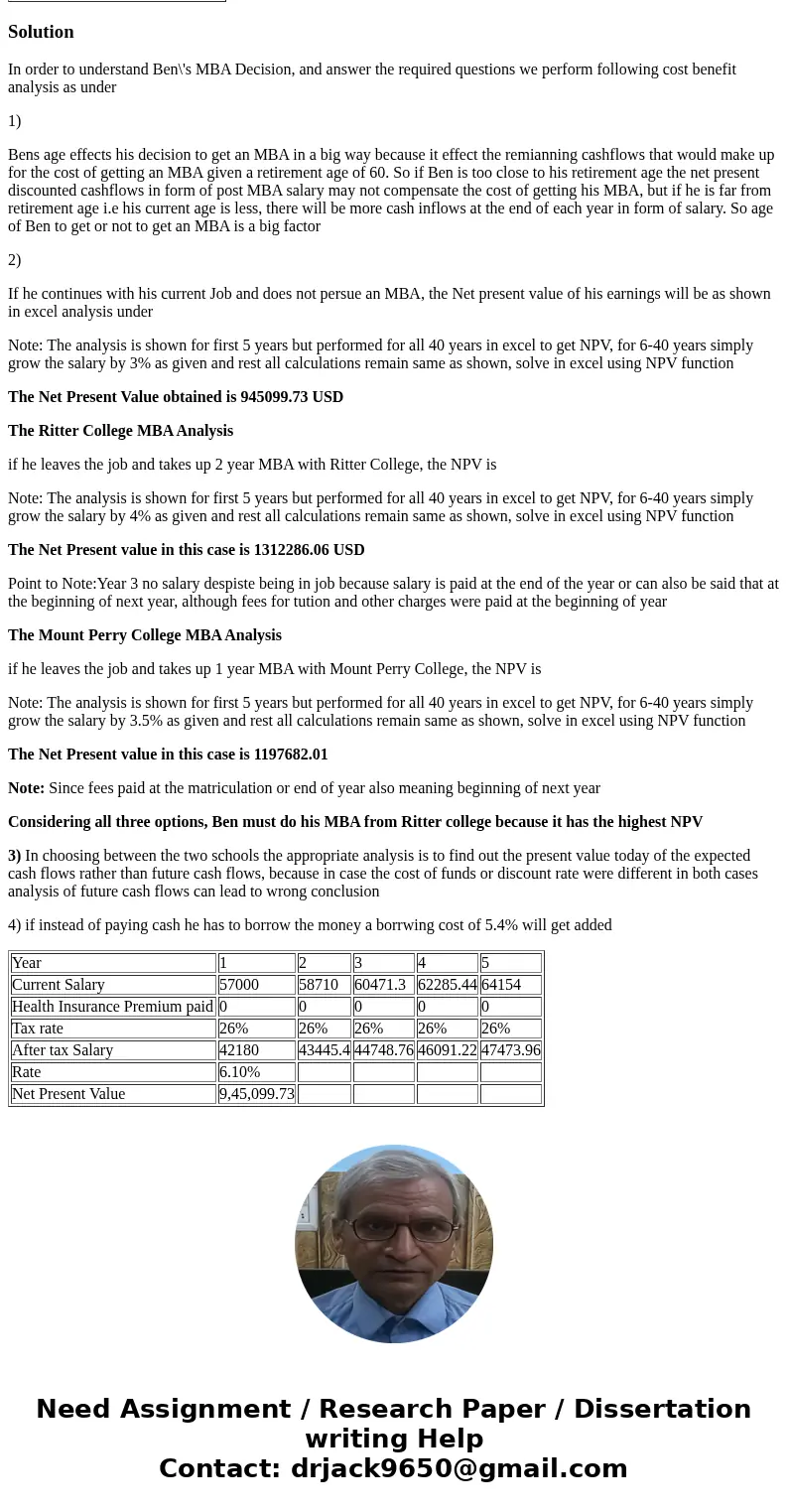THE MBA DECISION Ben Bates graduated from college six years
THE MBA DECISION
Ben Bates graduated from college six years ago with a finance undergraduate degree. Since graduation, he has been employed in the finance department at East Coast Yachts. Although he is satisfied with his current job, his goal is to become an investment banker. He feels that an MBA degree would allow him to achieve this goal. After examining schools, he has narrowed his choice to either Wilton University or Mount Perry College. Although internships are encouraged by both schools, to get class credit for the internship, no salary can be paid. Other than internships, neither school will allow its students to work while enrolled in its MBA program.
Ben’s annual salary at East Coast Yachts is $57,000 per year, and his salary is expected to increase at 3 percent per year until retirement. He is currently 28 years old and expects to work for 40 more years. His current job includes a fully paid health insurance plan, and his current average tax rate is 26 percent. Ben has a savings account with enough money to cover the entire cost of his MBA program.
The Ritter College of Business at Wilton University is one of the top MBA programs in the country. The MBA degree requires two years of full-time enrollment at the university. The annual tuition is $63,000, payable at the beginning of each school year. Books and other supplies are estimated to cost $2,500 per year. Ben expects that after graduation from Wilton, he will receive a job offer for about $105,000 per year, with an $18,000 signing bonus. The salary at this job will increase at 4 percent per year. Because of the higher salary, his average income tax rate will increase to 31 percent. The Bradley School of Business at Mount Perry College began its MBA program 16 years ago.
The Bradley School is smaller and less well known than the Ritter College. Bradley offers an accelerated, one-year program, with a tuition cost of $75,000 to be paid upon matriculation. Books and other supplies for the program are expected to cost $3,500. Ben thinks that after graduation from Mount Perry, he will receive an offer of $88,000 per year, with a $15,000 signing bonus. The salary at this job will increase at 3.5 percent per year. His average income tax rate at this level of income will be 29 percent.
Both schools offer a health insurance plan that will cost $3,000 per year, payable at the beginning of the year. Ben also estimates that room and board expenses will cost $2,000 more per year at both schools than his current expenses, payable at the beginning of each year. The appropriate discount rate is 6.1 percent. Assume all salaries are paid at the end of each year.
1. How does Ben’s age affect his decision to get an MBA?
2. Assuming all salaries are paid at the end of each year, what is the best option for Ben—from a strictly financial standpoint? He has three choices: remain at his current job, pursue a Wilton MBA, or pursue a Mt. Perry MBA. In order to determine the best option, you will need to calculate the after tax value of each option (perform analysis below).
PV of remaining at current job:
Total Value of a Wilton MBA:
Total Value of a Mount Perry MBA:
Which option should he choose?
3. In choosing between the two schools, Ben believes that the appropriate analysis is to calculate the future value of each option. How would you evaluate this statement?
4.Suppose that instead of being able to pay cash for his MBA, Ben must borrow the money. The current borrowing rate is 5.4 percent. How would this affect his decision to get an MBA?
5. What initial salary would Ben need to receive to make him indifferent between attending Wilton University and staying in his current position? Assume his tax rate after graduating from Wilton University will be 31 percent regardless of his income level.
Calculate the required salary 2 years from now, when he graduates:
Calculate the first salary payment (hint: use formula shown)
| PV of Current Job = |
| PV of Costs to attend Wilton = |
| PV of bonus = |
| Equal to PV of salary required: |
Solution
In order to understand Ben\'s MBA Decision, and answer the required questions we perform following cost benefit analysis as under
1)
Bens age effects his decision to get an MBA in a big way because it effect the remianning cashflows that would make up for the cost of getting an MBA given a retirement age of 60. So if Ben is too close to his retirement age the net present discounted cashflows in form of post MBA salary may not compensate the cost of getting his MBA, but if he is far from retirement age i.e his current age is less, there will be more cash inflows at the end of each year in form of salary. So age of Ben to get or not to get an MBA is a big factor
2)
If he continues with his current Job and does not persue an MBA, the Net present value of his earnings will be as shown in excel analysis under
Note: The analysis is shown for first 5 years but performed for all 40 years in excel to get NPV, for 6-40 years simply grow the salary by 3% as given and rest all calculations remain same as shown, solve in excel using NPV function
The Net Present Value obtained is 945099.73 USD
The Ritter College MBA Analysis
if he leaves the job and takes up 2 year MBA with Ritter College, the NPV is
Note: The analysis is shown for first 5 years but performed for all 40 years in excel to get NPV, for 6-40 years simply grow the salary by 4% as given and rest all calculations remain same as shown, solve in excel using NPV function
The Net Present value in this case is 1312286.06 USD
Point to Note:Year 3 no salary despiste being in job because salary is paid at the end of the year or can also be said that at the beginning of next year, although fees for tution and other charges were paid at the beginning of year
The Mount Perry College MBA Analysis
if he leaves the job and takes up 1 year MBA with Mount Perry College, the NPV is
Note: The analysis is shown for first 5 years but performed for all 40 years in excel to get NPV, for 6-40 years simply grow the salary by 3.5% as given and rest all calculations remain same as shown, solve in excel using NPV function
The Net Present value in this case is 1197682.01
Note: Since fees paid at the matriculation or end of year also meaning beginning of next year
Considering all three options, Ben must do his MBA from Ritter college because it has the highest NPV
3) In choosing between the two schools the appropriate analysis is to find out the present value today of the expected cash flows rather than future cash flows, because in case the cost of funds or discount rate were different in both cases analysis of future cash flows can lead to wrong conclusion
4) if instead of paying cash he has to borrow the money a borrwing cost of 5.4% will get added
| Year | 1 | 2 | 3 | 4 | 5 |
| Current Salary | 57000 | 58710 | 60471.3 | 62285.44 | 64154 |
| Health Insurance Premium paid | 0 | 0 | 0 | 0 | 0 |
| Tax rate | 26% | 26% | 26% | 26% | 26% |
| After tax Salary | 42180 | 43445.4 | 44748.76 | 46091.22 | 47473.96 |
| Rate | 6.10% | ||||
| Net Present Value | 9,45,099.73 |



 Homework Sourse
Homework Sourse